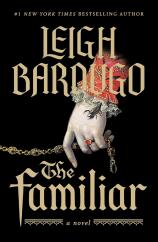Reading Group Guide
Discussion Questions
The Familiar

1. Early on, Luzia compares her situation with her employer’s, wondering if she had the opportunity, if she’d prefer to “sit on a cushion and embroider all day” like Valentina or if it would be better to continue spending her life as a scullion. How much control do you think she has over her circumstances? What would your choice be?
2. Valentina presents Luzia to her guests, expecting her to perform her “milagritos” for them. She’s reluctant at first but then complies. Do you think she had any other option here? How do you think her life would have been different if she’d refused?
3. Luzia’s aunt tells her that “some people brought misery with them like weather.” What do you suppose she means? Do you think that’s true? Are there people in the novel that seem to bear this out?
4. Santángel tells Luzia it’s a mistake to seek invisibility, that “it is a danger to become nothing.” What does he mean, in your opinion? Did your interpretation of this change as you learned more of his story? Do you think he’s correct?
5. Luzia knows that she might not survive the test, but she looks forward to having her mind challenged and her wits sharpened. “Let it be my ambition and not my fear that seals my fate,” she tells Santángel. Why do you think she’s not afraid?
6. What role did religion play in the lives of Luzia, Hualit and Valentina? How was religion different from belief for them?
7. Were you surprised by who ended up befriending Luzia, and who ended up betraying her?
8. Luzia thinks that Santángel had been using her, but that he also cared about her. “Both things can be true and still mean nothing,” she thinks. Do you agree with her?
9. Santángel thinks that his life has been “both long and remarkably boring.” What are your thoughts about immortality? Would you want to live forever?
10. Luzia acknowledges that Santángel is a liar and a killer --- that “he was not a good man” --- but then goes on to think “it was possible she didn’t want a good man.” Do you think Santángel was a good man? Do you think she loves him because he’s good in some respects, or in spite of it?
11. When Valentina sees King Philip, she’s surprised that he’s “just a man.” She had believed that “to be gazed upon by him would change her, give her value.” Do you think this is why people seek out celebrities? Are there other reasons that might encourage someone to court the rich, powerful or famous? Have you ever met someone famous? If so, did it change you in any way? Did they meet your expectations?
12. Valentina thinks, “There are different kinds of suffering… The kind that takes you by surprise and the kind you live with so long, you stop noticing it.” Do you agree with her? What examples can you think of in the context of THE FAMILIAR? Are there other instances where you’ve seen this play out in today’s world?
13. The threat of being suspected of heresy by the Spanish Inquisition hovers over Luzia even before we meet her in THE FAMILIAR. What did you know about the Spanish Inquisition and their methods before reading the book? Did you learn anything new about it?
14. In what ways do you feel the Spanish Inquisition influenced the competition, its participants and its audience, if at all? Were you surprised by its pervasive influence?
15. The author concludes with information about how each of the characters’ lives continued over the years. What did you think of their fates? Do you think everyone deserved their fate? Who, in your opinion, deserved better, who deserved worse, and why?
The Familiar
- Publication Date: March 25, 2025
- Genres: Fantasy, Fiction, Historical Fantasy, Historical Fiction
- Paperback: 400 pages
- Publisher: Flatiron Books
- ISBN-10: 1250884276
- ISBN-13: 9781250884275







